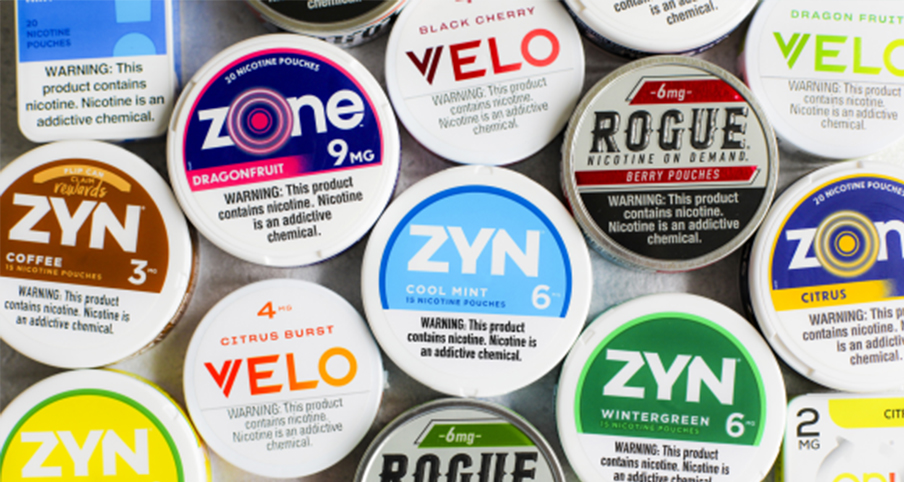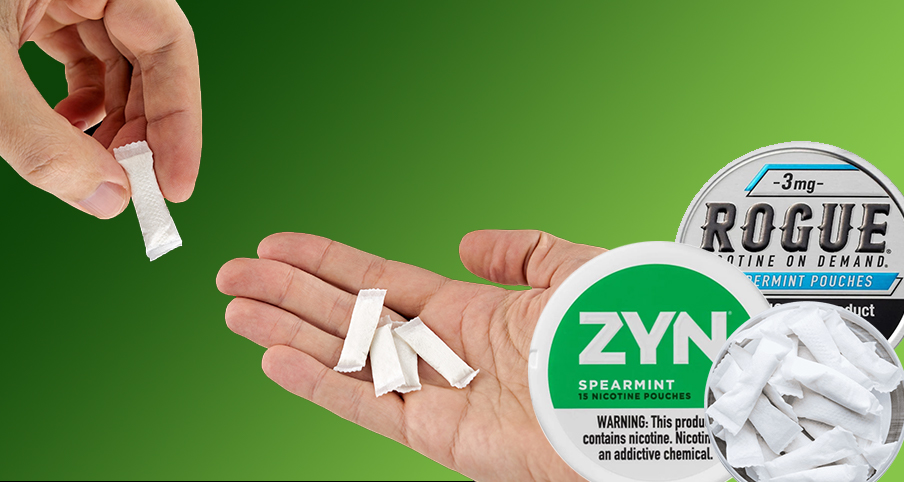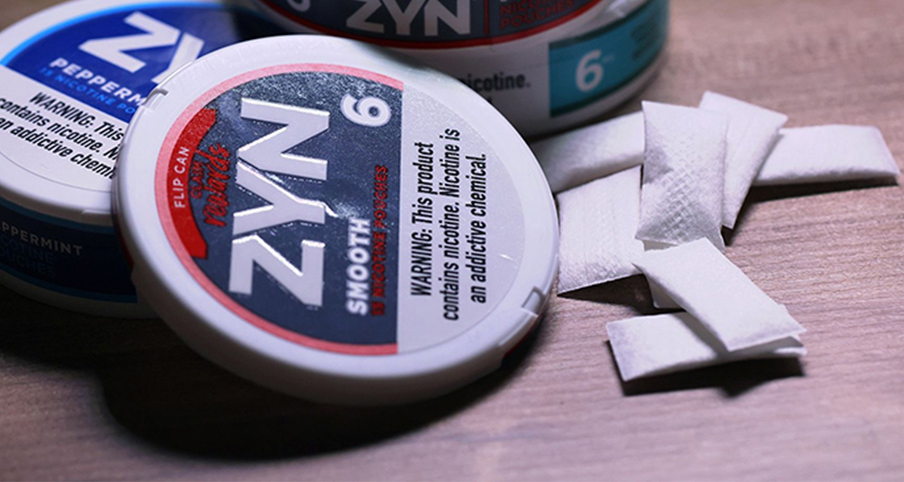As Zyn sales continue to soar, experts are raising concerns about the potential health risks associated with this highly addictive product.

Will Llamas, a resident of Stamford, Connecticut, was not a regular tobacco user when a friend introduced him to Zyn nicotine pouches. “I had convinced myself that because there wasn’t any tobacco, these were pretty safe,” Llamas explained. “I liked how it made me feel. It tasted good. And so I was hooked.”
The 32-year-old became quickly addicted to Zyn, using up to 20 pouches a day. These pouches, available in 3- or 6-milligram doses of nicotine, come in various flavors including coffee, mint, and citrus. “It gives you a shot of dopamine, so you just feel a little energized, happier, almost focused,” Llamas said.
Nicotine pouches like Zyn have surged in popularity in recent years. Originally a Swedish brand, Zyn was acquired by Philip Morris International (PMI) in 2022. In the first three months of this year alone, more than 131 million cans of Zyn were sold, marking an 80% increase from the same period last year. The rising demand recently led to a shortage, sparking outcry on social media. Other products in the market include Rogue, Velo, and On!, all marketed as smoke-free, spit-free, and hands-free alternatives to traditional tobacco products.
Health and Safety Concerns
While nicotine pouches are often marketed as safer alternatives to cigarettes and other tobacco products, experts caution that their smoke-free and spit-free nature can create a misleading perception of being harmless. “Usually when you say that something is free of something, it makes it seem less harmful,” said Tory Spindle, an associate professor of psychiatry and behavioral sciences at Johns Hopkins School of Medicine. “Our concern is that this may make them more appealing to someone who otherwise would have never tried any tobacco product.”
Spindle acknowledged that while nicotine pouches could serve as a better alternative for established tobacco users, the challenge lies in making these products accessible to such individuals without inadvertently creating a new wave of nicotine addiction among non-users.
In response, PMI stated it is “committed to developing products such as Zyn that are scientifically substantiated as a better alternative to continued smoking.”
Llamas shared that after about a year of using Zyn, he began experiencing gastrointestinal issues, which he now attributes to the nicotine pouches. “I got many tests done. I went to a hospital, got an ultrasound, and a colonoscopy, and all they found was that my stomach was inflamed,” he said. After researching his symptoms online, he suspected the pouches were the cause. “I haven’t had stomach issues since the day I quit cold turkey.”
Llamas also noted a significant drop in his resting heart rate after quitting, as detected by his Apple Watch. “I really wish I had more information when I took my first pouch,” he said. “If I had known that it was going to cause me so many health issues, I wouldn’t have started.”
Expert Opinions
Dr. Donna Shelley, a professor and vice dean for research at the New York University School of Global Public Health, pointed out that while nicotine pouches don’t cause the same health problems as tobacco-containing products, they are not entirely safe. “Some of the negative health effects of nicotine pouches include gastrointestinal symptoms like nausea, gum soreness, and ulcers, as well as cardiovascular risks like elevated heart rate,” said Shelley. “We don’t know the full safety profile yet.”
A 2023 study comparing Zyn pouches to smokeless tobacco and nicotine replacement products found that while Zyn does not contain known cancer-causing agents like nitrosamines, it does contain potentially harmful chemicals such as formaldehyde, according to the FDA.
Dr. Varisha Parikh, a prosthodontist at Parikh Prosthodontics in Los Angeles, has warned about the potential dental health effects of nicotine pouches on social media. “Placing something on your gum tissue for a prolonged period of time, especially a chemical agent, is just asking for issues in that area,” she said.
Sydney Cunningham, a 30-year-old from Safford, Arizona, reported experiencing gum recession from using Zyn. Cunningham started using the pouches while pursuing her doctoral degree for an extra boost to help with studying. “I put the Zyn pouches in the back of my mouth near the wisdom teeth on the upper side, and that is where I’m having these gum issues,” she said.
Risks to Kids and Teens
A major concern among medical experts is the use of nicotine pouches by kids and teens. “When young people use nicotine, it changes the way their brains work, potentially setting them up for a lifelong addiction to nicotine,” said Judith Gordon, a professor and associate dean for research at the University of Arizona’s College of Nursing.
Spindle, who is studying the addictive potential of different flavors of nicotine pouches, noted that “they do seem to be pretty heavily marketed to youth.” Vaughan Rees, director of the Center for Global Tobacco Control at Harvard T.H. Chan School of Public Health, added that the design of nicotine pouches makes them easy for adolescents to use and conceal, increasing their appeal.
A recent study published in the Journal of the American Medical Association found that while nicotine pouch use remains low among U.S. adults, it is rising. Study co-author Adam Leventhal, director of the Institute for Addiction Science at the University of Southern California, suggested that the increase in sales might be driven by underage users.
Earlier this year, the FDA issued 119 warnings to retailers selling Zyn to underage customers. “The FDA remains concerned about any tobacco product that may appeal to youth,” an agency spokesperson said. The FDA is currently reviewing the marketing applications for Zyn and other nicotine pouches, although these products are still available in the U.S. during the review period.
Philip Morris recently suspended online sales of Zyn following inquiries about compliance with Washington, D.C.’s ban on flavored tobacco sales, but the products remain widely available online through other sellers.
In a statement, Philip Morris reiterated that “Zyn’s marketing is directed toward legal age nicotine users who are 21+.”
Six months after quitting, Llamas admitted he still experiences cravings. “I don’t know if they’re ever gonna go away,” he said. Quitting was challenging because he used Zyn pouches during almost every activity. “I had to relearn how to enjoy these activities and my body has to create its own dopamine,” he explained. “So going to the gym, driving, and working — all these things I had to relearn how to enjoy.”
This professional perspective on nicotine pouches highlights both the popularity and the potential health risks associated with products like Zyn. While marketed as a safer alternative for existing tobacco users, the rise in usage among non-smokers and younger demographics raises significant concerns.


